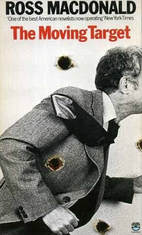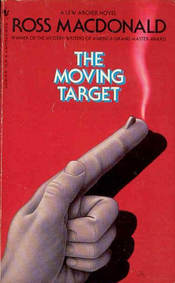
What was so appealing that I immediately wanted to revisit this book? Simply put, it's MacDonald's writing that surprised me and stirred my admiration. I knew that, if a writer wanted to deliver a hardboiled crime story, he shouldn't try to reinvent the genre. All of the tropes, from solo detective to wealthy client to femme fatale, are effective to start and maintain the tale. At the same time, if he merely tries to imitate Chandler and Hammett, then the work will likely feel slight and uninspired. With Lew Archer, MacDonald strikes the perfect balance. His detective is independent, quick-witted, and appropriately pessimistic about the human race, but he also demonstrates an educated, distanced perspective through his first-person observations of people and situations that quickly wins over the reader.
Lew Archer is still a bit of a cipher – in this genre, it's nearly always the criminals who are described in detail, in part because they are seen through the lens of a detective narrator who wants the spotlight directed off the rock-turner and onto the wriggling creatures underneath – but MacDonald builds empathy for Archer because of the character's wit, his desire to bring order to a chaotic world, and his ability to analyze these desperate people and understand them (often better than they understand themselves).
MacDonald's own understanding of the genre is immediately apparent on the first page, as a taxi drives working-class Archer toward the seaside estates of the wealthy and the privileged: "The light-blue haze in the lower canyon was like a thin smoke from slowly burning money." Once there, Elaine Sampson engages the detective to find her missing husband, not out of concern but because he may be spending money on someone else that she had earmarked to inherit. The case quickly becomes complicated as the businessman's disappearance leads Archer to an alcoholic Hollywood starlet past her prime, an oily entrepreneur who employs a bodyguard with a vicious streak, and the missing man's restless daughter, Miranda. When a ransom note appears and a drop-off turns deadly, Archer needs to separate artifice from reality to reveal the true motive of each person he meets, despite the façade.
Ross MacDonald's writing here – especially the narration and point of view he gives his protagonist – is observant and perfectly pitched. It's a quality that looks easy to create but is not, as the wrong note or overdescription can easily tip into parody. And yet Archer is sympathetic, and the reader trusts that perspective. His complicated response to Sampson's daughter, a mix of physical attraction and avuncular protectiveness, is captured in a line like this one, as they drive along a windy and winding mountain road:
Once or twice on a curve Miranda leaned against me, trembling. I didn't ask her whether she was cold or afraid. I didn't want to force her to make a choice.

I already have MacDonald's second Lew Archer novel, The Drowning Pool, waiting to be read.
 RSS Feed
RSS Feed